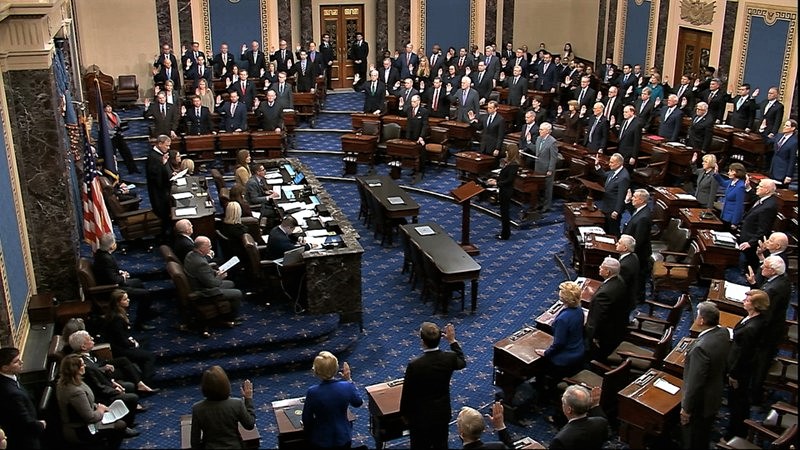
As I write this commentary, I’m watching Chief Justice John Roberts ask all 100 Senators to stand and take a special oath for the Impeachment Trial of President Trump.
“Do you solemnly swear that in all things appertaining to the trial of the impeachment of Donald John Trump, president of the United States, now pending, you will do impartial justice according to the Constitution and laws, so help you god?”
Legally, however, there is no mechanism for enforcement of this oath. Which means that it all comes down to one word: ethics.
In a story that appeared in The Atlantic (Dec. 16, 2019), legal experts Quinta Jurecic and Benjamin Wittes write that Senator Lindsey Graham said, “ ‘This thing will come to the Senate, and it will die quickly, and I will do everything I can to make it die quickly,” he said. “I am trying to give a pretty clear signal I have made up my mind. I’m not trying to pretend to be a fair juror here. …
“Senate Majority Leader Mitch McConnell, speaking to Fox News, was even more explicit. ‘Everything I do during this, I’m coordinating with White House counsel. There will be no difference between the president’s position and our position as to how to handle this to the extent that we can,’ he said. ‘We have no choice but to take [the impeachment trial] up, but we will be working through this process, hopefully in a fairly short period of time, in total coordination with the White House counsel’s office and the people who are representing the president in the well of the Senate.’ ”
“The two senators,” Jurecic and Wittes say, “appear to need a brief remedial course on their constitutional obligations. Article I, Section 3, Clause 6 of the Constitution declares that ‘the Senate shall have the sole Power to try all Impeachments.’ And when the Senate is sitting ‘for that Purpose, [senators] shall be on Oath or Affirmation.’ ”
Both McConnell and Graham have already announced their bias. Therefore, both should be recused from all participation in the matter before the Senate.
One of the most fundamental of ethical values is that of Fairness.
“The concept,” ethicist Michael Josephson writes, “embodies notions of justice, equity, due process, openness and consistency.”
However, Josephson adds, “Fairness is one of the most elusive ethical values since, in most cases, stakeholders with conflicting interests sharply disagree on what is fair.”
Many Republican Senators have made clear that the impeachment by the House was unfair. Despite a mountain of evidence and testimony from career State Department officials (and now, new documents that have come to light from an associate of Trump’s personal lawyer, Rudy Giuliani), most Republicans declared the actions by the House to be singularly unfair given the fact that some Democrats running for office, stated that they were intent on impeachment before the Ukrainian issue was even on their radar.
“We’re not too concerned about it,” White House press secretary Stephanie Graham said of the Impeachment Trial. “Once again, we know that everything in the Senate is going to be fair.”
“Although some results are clearly unfair,” Josephson explains, “rarely is there a single fair result. Thus, fairness often refers to a range of morally justifiable outcomes rather than discovery of the fair answer.”
However, “A fair person,” Josephson defines, “scrupulously employs open and impartial processes for gathering and evaluating information necessary to making decisions. Decisions should be made only on appropriate criteria after all relevant information has been objectively evaluated.
“…decisions,” Josephson continues, “should be made with impartiality and objectivity based on consistent and appropriate standards and avoiding favoritism or prejudice.”
Both Graham and McConnell have adamantly stated that they do not intend to be either impartial or objective.
“Senator Ron Johnson has written that the impeachment inquiry is ‘a continuation of a concerted, and possibly coordinated, effort to sabotage the Trump administration that began in earnest the day after the 2016 presidential election,” Jurecic and Wittes note.
And “Senator Ted Cruz flatly declared that the impeachment effort is ‘going to go nowhere’ in the Senate.”
Notwithstanding their bias, the two legal scholars say that, “Senator Mitt Romney’s comments on the impeachment trial are a decent model of what such restraint looks like: ‘There will be a trial in the Senate,’ he has commented, and ‘we will hear the arguments from both sides. Upon those arguments, and whatever evidence they present, I’ll make a decision.’ ”
Republican Senators Lisa Murkowski and Susan Collins have not only voiced their interest in hearing the evidence, they have indicated that they would be open to witness testimony, something Senate Leader McConnell is opposed to.
During the next few weeks or days, Senators would do well to remember the clearest and rational definition of ethics from Josephson:
“Ethics is having the character and the courage to do the right thing, even when it costs more than you want to pay.”
The question before Senators is this: will they stand by their party or stand on ethical principle?
Comments
Leave a Comment











Definitely an ethical oath. I “will do impartial justice according to the Constitution and laws, so help you God.” Lets pray to God and our elected officials for truth!